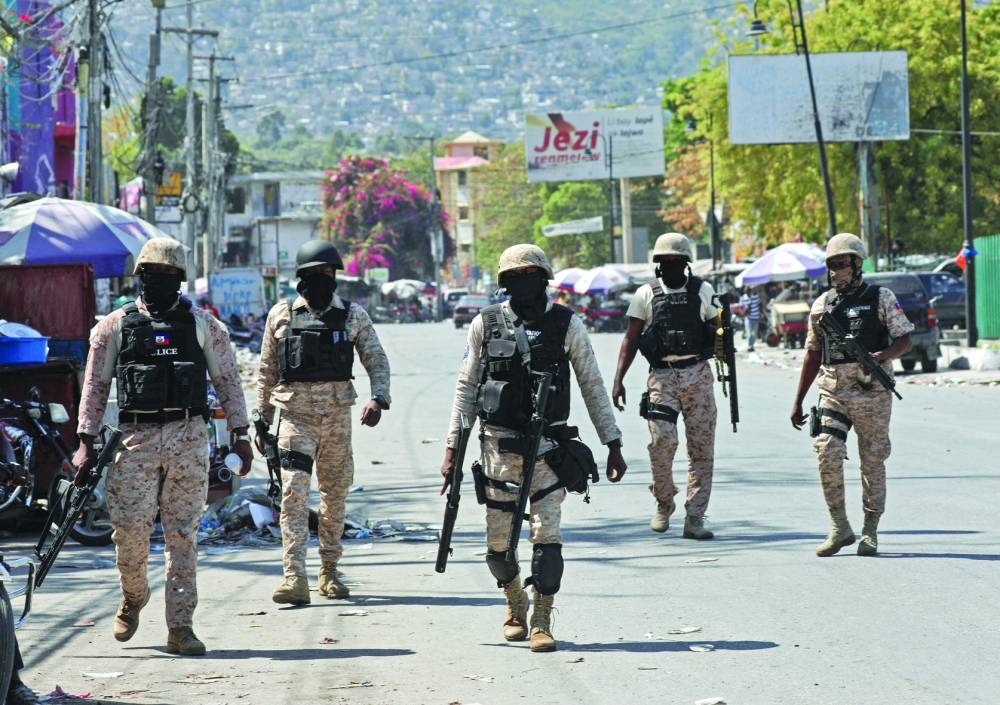Sporadic gunfire rang out in Port-au-Prince on Friday night, an AFP correspondent there heard, as residents desperately sought shelter amid the recent explosion of gang violence in the Haitian capital.
Humanitarian conditions continued to deteriorate, and aid groups and non-governmental organisations (NGOs) have warned of a shortage of medical resources and food supplies after armed groups unleashed widespread chaos on the long-troubled Caribbean nation last week.
According to an AFP journalist on the scene, gunshots were heard throughout the capital late on Friday, especially concentrated in the southwestern districts of Turgeau, Pacot, Lalue and Canape-Vert.
Fearful residents scrambled to take shelter, with witnesses telling AFP that they had seen clashes “between police officers and bandits” as gangs apparently tried to commandeer police stations in the city centre.
Criminal groups, which already control much of Port-au-Prince as well as roads leading to the rest of the country, have attacked key infrastructure in recent days, including two prisons, allowing the majority of their 3,800 inmates to escape.
The gangs, along with some ordinary Haitians, are seeking the resignation of Prime Minister Ariel Henry, who was due to leave office in February but instead agreed to a power-sharing deal with the opposition until new elections are held.
On Thursday, the government issued a month-long state of emergency for the western region, which includes the capital, and decreed a nighttime curfew until tomorrow.
Port-au-Prince resident Fabiola Sanon told AFP that her 32-year-old husband James was killed in the unrest.
He used to wake up early to earn money for their son’s breakfast before taking him to school, she said.
“James has never been in conflict with anyone,” Sanon said. “He’s a simple cigarette salesman.”
Haiti’s airport remained closed on Friday, while the main port – a key source for food imports – cited instances of looting since it suspended services on Thursday, despite efforts to set up a security perimeter.
“If we cannot access those containers (full of food), Haiti will go hungry soon,” the NGO Mercy Corps warned in a statement.
An alliance of Caribbean nations, CARICOM, on Friday summoned envoys from the US, France, Canada and the United Nations to a meeting on Monday in Jamaica to discuss the outbreak of violence.
Guyana’s President Irfaan Ali said the meeting will take up “critical issues for the stabilisation of security and the provision of urgent humanitarian assistance”.
The crisis has drawn concern from the United States, which has told the absent Henry to enact “urgent” political reform to prevent further escalation.
Henry was in Kenya when the violence broke out and has since been unable to return. He is reportedly stranded in Puerto Rico.
The UN has warned that thousands of people, especially pregnant women, are in danger of losing vital healthcare.
“If greater Port-au-Prince remains at a standstill in the coming weeks, almost 3,000 pregnant women could be denied access to essential healthcare, and almost 450 could face life-threatening obstetric complications if they do not receive medical assistance,” the UN’s office in Haiti said in a statement.
The body also warned that more than 500 sexual violence survivors could be without medical care by the end of March if conditions do not improve.
“Today, too many women and girls in Haiti are victims of indiscriminate violence committed by armed gangs. The United Nations stands by them and is committed to continuing to provide the assistance they need,” said the UN’s Resident and Humanitarian Co-ordinator Ulrika Richardson.
In addition, hundreds of thousands of students could see their records destroyed, as schools and ministry of education offices were vandalised.
Such “irreparable damage” could make it impossible for pupils to receive their transcripts or diplomas in the future, a statement from the ministry of national education and vocational training said, calling for the protection of schools as a “public good”. – AFP

Police patrol a street in Port-au-Prince after authorities extended the state of emergency amid gang violence that has threatened to bring down the government, forcing thousands to flee their homes.
